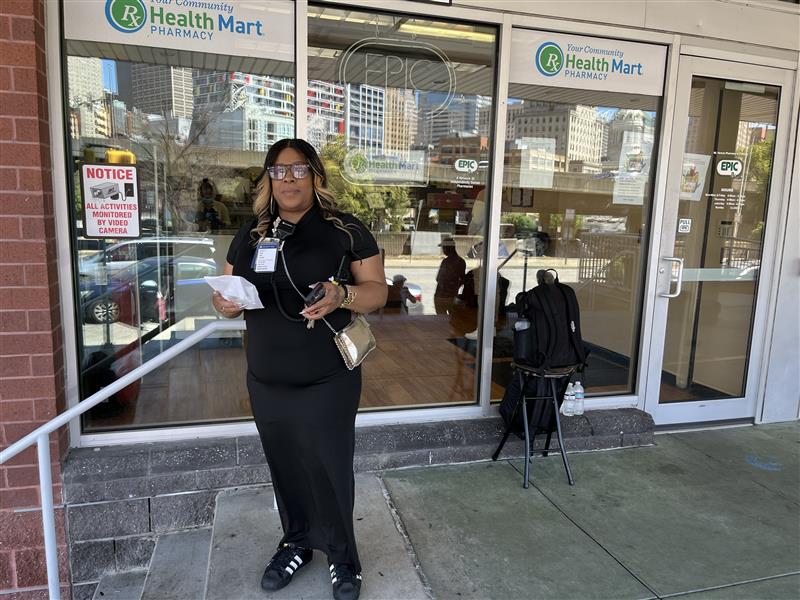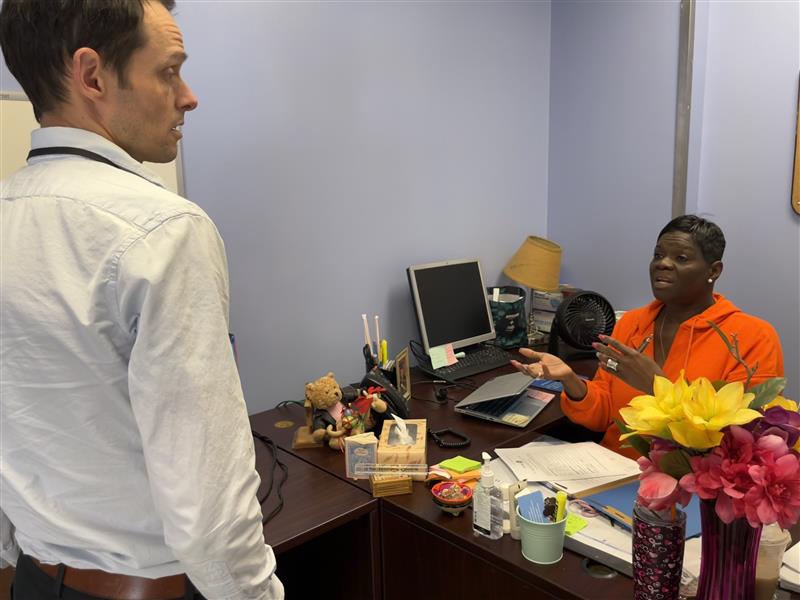Have you ever felt like throwing up your hands in frustration? Sometimes it can feel like “nothing” is working or “everything” is against you. Each of us has strengths. Even if the odds are truly against us, there are actions we can take.


08.23.24
This January, we established weekly shelter-based medical clinics. In this edition of “Day in the Life,” Senior Director of Medicine for Community Sites Tyler Gray, MD, and Client Service Specialist Luciana Wise-Oliver share a look into one Friday session at the city’s largest emergency shelter.
8:00AM Tyler walks to the entrance of the Weinberg Housing and Resource Center and chats with shelter staff on his way in the door. “Hey doc!” they greet him.
As he sets up on the third floor, a woman ducks into the office to ask for a referral for an orthopedic appointment she has next week. They can do that, Tyler assures her. He
puts in the referral through the system so it’s ready.
“We’ve had a lot of positive responses from clients,” he says. “We knew that a lot of people who live here were having trouble accessing medical care at the Fallsway Clinic. Right now, we offer medical sessions on Wednesday and Friday mornings. And we hope to add a third session soon.”
 8:30AM Once Luciana arrives, they review the list of shelter residents who have signed up for appointments, which run from 8:30 to 11:30am. They are normally joined by a medical assistant (who was out this day) and see 8-10 people, or 12 when it’s raining. But today it’s nice out, so fewer residents are in the building, and it’ll be a slower pace.
8:30AM Once Luciana arrives, they review the list of shelter residents who have signed up for appointments, which run from 8:30 to 11:30am. They are normally joined by a medical assistant (who was out this day) and see 8-10 people, or 12 when it’s raining. But today it’s nice out, so fewer residents are in the building, and it’ll be a slower pace.
One of Luciana’s key roles is coordinating with shelter staff to help residents in the building
make it to their appointments. She walks over to the manager in the women’s dorm to see if anyone is ready yet.
“Number 52?” they yell out. “Number 11?” Residents are identified by their bed numbers to maintain confidentiality. The first two women aren’t in the dorm, but a third can come early.
 9:32AM Tyler and the first client of the day head to the exam room. “How can I help you today?” She brings up several concerns related to her health and the shelter environment. “Can it be documented that I need a second mattress because of my arthritis?” she asks. Tyler says he can put in the request.
9:32AM Tyler and the first client of the day head to the exam room. “How can I help you today?” She brings up several concerns related to her health and the shelter environment. “Can it be documented that I need a second mattress because of my arthritis?” she asks. Tyler says he can put in the request.
“You mentioned you have high blood pressure. Would you like it checked?” As he readies the blood pressure cuff, they talk through options for her to check her blood pressure on her own—something she knows how to do but doesn’t have the equipment for.
“Stay in touch with your primary care provider about this. You can ask your doctor about getting blood pressure cuffs and how often to check it. You can pick them up for $30-$50 at Walgreens or CVS.”
“Oh! I’ll try to pick one up,” she says, feeling encouraged.
Next, they discuss some chronic pain she’s been having. “When I lived in my own apartment, I did my own exercise, cooked my own food and I would swim,” she reflects. But a year and a half into her stay at the shelter, there just isn’t the space or option for these activities.
Since she sees a primary care doctor elsewhere, Tyler suggests ways to request coverage for physical therapy. “I would say to your doctor, ‘Where I'm living, I can't do home exercises. Can I get a referral to a physical therapy site?’ I have faith your insurance can accommodate that.”
10:00AM Time for the next client, a woman in her late 70s who Tyler has seen regularly during her threemonth shelter stay. “How are you? You don’t seem quite like yourself today.”
She’s been having trouble sleeping (difficulties with lights, noise and dorm room neighbors are common in the shelter). Settling on the exam chair, she pulls a napkin out of her bag with a handwritten list of questions and concerns.
She asks for a refresher on certain terms they talked about last visit. She is also concerned about a prescription refill for pain management. Even though a pharmacy is only two blocks away, mobility is a major barrier. “I have to take a Lyft to get to the pharmacy,” she explains.
“If you get prescription coverage, you can get meds delivered to you,” Tyler suggests.
Next on her list is a referral. She pulls out the paperwork. “I don’t understand where this is happening or what the procedure is.” Tyler takes a look. “This is for an x-ray of your lower back and hips. Luciana can always fax these to the imaging center for you. Is that a location you can get to?”
“Yes, that’s where I want to go.”
At the end of the visit, Tyler checks in with Luciana about faxing the referral and he calls in the next client.
 10:20AM Luciana walks downstairs to see if any other residents with appointments are in the day room and finds one person on the list. Back at her desk, the client in her 70s stops over with the exact medicines that she needs refilled. Looking over the information, Luciana says aloud, “Hmm but you’re going to run out before [Nurse Practitioner] Kirstin McCurnin is back on Wednesday.” She sends Tyler a message, checking whether she could run to Mt. Vernon Pharmacy to pick up the refills on the clients’ behalf.
10:20AM Luciana walks downstairs to see if any other residents with appointments are in the day room and finds one person on the list. Back at her desk, the client in her 70s stops over with the exact medicines that she needs refilled. Looking over the information, Luciana says aloud, “Hmm but you’re going to run out before [Nurse Practitioner] Kirstin McCurnin is back on Wednesday.” She sends Tyler a message, checking whether she could run to Mt. Vernon Pharmacy to pick up the refills on the clients’ behalf.
With Tyler’s go ahead, she calls the pharmacy to arrange the pick-up and heads out the door. “I like to help out when I can,” Luciana says. “For me, it's getting my exercise in to walk the two blocks. But for this client, it would be impossible.”
When Luciana returns with the prescription, the client jokes, with a big smile, “How much do you charge for delivery?”
11:00AM Meanwhile, Tyler continues to see clients one by one. He fills out medication refills and forms, completes a cervical cancer screening and shares lab results for one person without a phone. Another person shares a health concern that she had never felt comfortable talking about with doctors before. “That’s a positive sign of building trust,” Tyler reflects afterwards.
A big part of his role outside of medical care is helping clients navigate who to talk to for their requests and setting expectations for what might be possible in the shelter. “I have to constantly balance shelter interest and client interest. If I feel strongly that there’s a medical interest, I talk to shelter staff to figure out what’s a reasonable accommodation.”
11:30AM It’s getting close to the end of the medical clinic. Luciana goes downstairs for a final call for appointments. “If Mark* is here, I’d like to see him” says Tyler. “I know he was recently released from the hospital.”
“They say he’s been gone from here,” Luciana responds. In the emergency shelter setting, it’s hard to keep track of who is staying here on a given night, and only shelter residents are eligible for this clinic.
 To round out his notes for the day, Tyler walks downstairs to talk to the shelter’s case management staff, including Patrice Emerson. Since residents have their own case managers through Catholic Charities, which operates the shelter, it helps to coordinate and get extra context for some of the needs brought up in the exam room.
To round out his notes for the day, Tyler walks downstairs to talk to the shelter’s case management staff, including Patrice Emerson. Since residents have their own case managers through Catholic Charities, which operates the shelter, it helps to coordinate and get extra context for some of the needs brought up in the exam room.
12:15PM After closing up, Luciana heads to the West Baltimore clinic to finish out her day, and Tyler, as a director of multiple sites, uses the afternoon for remote staff meetings and to respond to client needs from other sites.
More Recent News
Send one email today to advocate for housing that serves all Marylanders. Let Governor Moore know that more permanent supportive housing is a good thing—and urge him to stay the course.
At our annual staff holiday party, we take time to honor and celebrate staff members who best represent our Core Values and one HCH-er at Heart.
Larrice is a mother, grandmother, teacher, cook and storyteller who was recently featured in our original documentary, “Taking Care: Portraits from Baltimore.”


